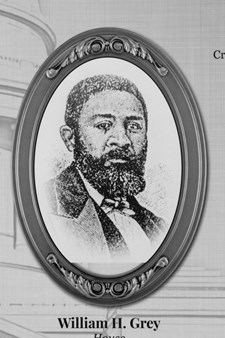William Henry Grey facts for kids
Quick facts for kids
William Henry Grey
|
|
|---|---|
 |
|
| Arkansas State Representative for Phillips County | |
| In office 1868–1869 |
|
| Personal details | |
| Born | December 22, 1829 Washington, D.C. |
| Died | November 8, 1888 (aged 58) Helena, Arkansas |
| Nationality | American |
| Political party | Republican |
William Henry Grey (born December 22, 1829, in Washington, D.C. – died November 8, 1888, in Helena, Arkansas) was an important leader in Arkansas. He was a state lawmaker, a store owner, and a church leader. He held many elected jobs during the Reconstruction era, which was the time after the American Civil War when the country was rebuilt.
The Encyclopedia of Arkansas History and Culture says Grey was a "tireless fighter for the rights of freedmen." Freedmen were formerly enslaved people who were now free. In 1868, he was one of the first six African Americans to serve in the Arkansas House of Representatives. His burial site in Magnolia Cemetery was added to the National Register of Historic Places in 2019.
Contents
William Grey's Early Life
William Grey was born in December 1829 in Washington, D.C. He was born a free person of color, meaning he was not enslaved. His family later moved to Pittsburgh, Pennsylvania, and then to Cincinnati, Ohio, in the 1840s.
In 1852, Grey moved to St. Louis, Missouri. He worked as a cook on Mississippi River steamboats. In 1854, he married Henrietta Winslow, and they had eight children together. Grey was a member of the African Methodist Episcopal Church. He felt called to serve the church and became a lay minister, which is a church leader who is not an ordained pastor. At some point, he moved his family south from Missouri to the Arkansas Delta region. He already knew this area from his steamboat travels.
Serving Arkansas During Reconstruction
In 1865, as the American Civil War was ending, Grey lived in Helena, Arkansas. He owned and ran a grocery store and bakery. That year, he went to a meeting in Little Rock for African Americans. They met to talk about the Thirteenth Amendment, which officially ended slavery in the United States.
Helping Write Arkansas's New Laws
In 1868, people in Phillips County elected Grey to the 1868 Arkansas Constitutional Convention. He was one of eight African-American delegates at this important meeting. The convention was difficult because of strong feelings left over from the war. Some delegates, called "Conservatives," tried to stop African Americans from getting the right to vote. Another issue they debated was marriage between different races.
Grey worked on four of the convention's committees. These included committees for education and voting rights. The new Arkansas constitution was approved across the state with support from the Republican Party.
Grey's Political Career
After the new Arkansas government started, Grey's neighbors in Phillips County elected him to the state legislature. He served from 1868 to 1869. Later, in 1875, Grey briefly filled an empty spot in the Arkansas Senate.
In 1870, Grey was elected as the clerk of the First Circuit Court. He also became the Recorder of Deeds. In 1872, he was chosen to be a delegate to the 1872 Republican National Convention in Philadelphia. He was asked to help nominate Ulysses S. Grant for a second term as U.S. President. It is believed that Grey's speech was the first time an African American spoke at a major U.S. political party's presidential convention.
Also in 1872, Grey became the Arkansas Commissioner of Immigration and State Lands. Arkansas needed more people to settle there. He had to leave these jobs in 1874 after he might have had a stroke. Grey went back to Helena and was chosen as the clerk for the Phillips County probate and county courts.
Challenges in the Jim Crow Era
The 1870s brought tough times for Grey. The 1868 state constitution he helped create was replaced in 1874. A new document, supported by many former Confederates, took its place. This new constitution opened the door for Jim Crow government. These laws created racial segregation and took away rights from African Americans.
In September 1878, Grey became paralyzed. This was likely caused by a second stroke. The Democratic Party of Arkansas, which at that time supported the interests of former Confederates, took back control of Phillips County that same year. This meant Grey could no longer be active in public life. He lived quietly until he passed away.
William Grey's Legacy
Historian Harry Ashmore called William Grey "the outstanding black leader of the period" in Arkansas. Grey fought hard for equality and played a key role in Arkansas politics during a very important time in history.
Quote
- "We are here to receive the amount due us from the State of Arkansas. Pay us, sir, the rights and privileges due us as citizens of the United States and the State of Arkansas."
 | James Van Der Zee |
 | Alma Thomas |
 | Ellis Wilson |
 | Margaret Taylor-Burroughs |

